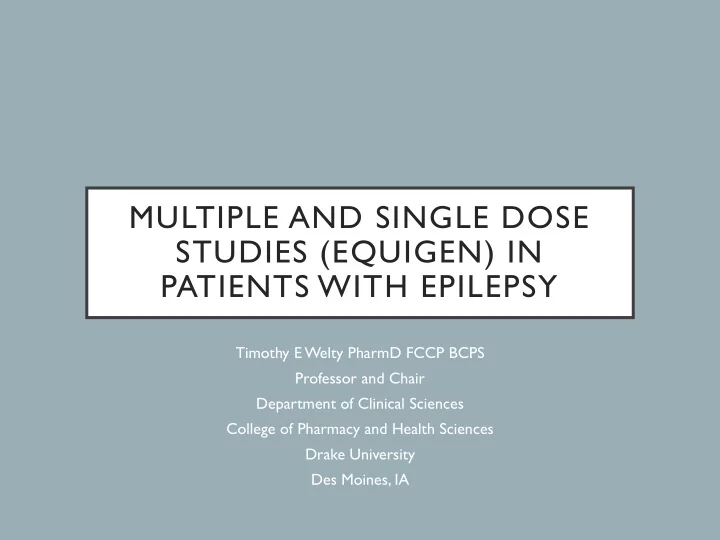

MULTIPLE AND SINGLE DOSE STUDIES (EQUIGEN) IN PATIENTS WITH EPILEPSY Timothy E Welty PharmD FCCP BCPS Professor and Chair Department of Clinical Sciences College of Pharmacy and Health Sciences Drake University Des Moines, IA
DISCLOSURES • Consultant: Upsher-Smith, Eisai
GOALS • Describe the design of the Equigen studies • Present Equigen study results • Consider implications of Equigen study results
QUESTIONS • Are results from bioequivalence studies generalizable to patients with epilepsy taking antiepileptic drugs? • Can a patient be switched between disparate generic products? • What is the within-patient variability seen with the brand product and generic products?
LAMOTRIGINE CHOICE • Reports of problems with substitution in the MedWatch program • Commonly used newer antiepileptic drug • Retrospective studies suggested problems with substitution
EQUIGEN STUDIES • Chronic dose study • Patients with epilepsy receiving lamotrigine • Switch between 2 disparate generic lamotrigine products • T wo PK analyses for each generic product • Single dose study • Patients with epilepsy NOT receiving lamotrigine • Received 25 mg dose of brand product, generic-low, generic- high products • T wo PK analyses for each product
DISPARATE PRODUCT SELECTION • ANDA data from FDA files • Dissolution and content uniformity data from independent lab testing • Excipient composition • Market availability of single lots
CHRONIC DOSE STUDY
CHRONIC DOSE ADHERENCE • Careful monitoring of adherence • Diary • Tablet counts • Computerized prescription bottle caps • Rigorous standards for adherence • 3 days prior to PK, take doses within 1 hour of scheduled time • No missed doses for week prior to PK
EQUIGEN Study Design: Chronic Dose *19 blood levels over 12 hours at each inpatient PK visit
CHRONIC DOSE RESULTS • 33 subjects • 58% received other antiepileptic drugs • 18% on enzyme inducing drugs with known interactions with lamotrigine • Enzyme inhibiting drug (i.e., valproate) excluded • No loss of seizure control • No unexpected adverse effects • Side effect measure scores not different between products
CHRONIC DOSE AUC AND C MAX Generic LTG-high Generic LTG-low First Second Mean Within First PK Second Mean Within PK PK Subject % (n=33) PK Subject % (n=33) (n=33) change (n=33) change Dose-normalized 2723 2727 1.09% (16.76; 2710 2704 -0.58% (10.35; AUC (0-120) (1145) (1173) -4.6 to 6.8) (1129) (1200) -3.0 to 4.1) (µg-mL/min) Dose-normalized 5.03 5.02 0.58% (14.83; 4.96 4.95 0.73 (13.93; C max (µg/mL) (1.8) (1.9) -4.5 to 5.6) (1.9) (1.9) -4.0 to 5.5)
CHRONIC DOSE CURVES
CHRONIC DOSE CONCLUSION • No statistical difference in AUC or C max when switching between disparate generic products. • Within-subject variability average <10% (2 subjects >30%). • No change in clinical response detected. • Not powered for statistical comparison.
REFERENCE • Privitera MD, Welty TE, Gidal BE, et.al. Generic-to-generic lamotrigine switches in people with epilepsy: the randomized controlled EQUIGEN trial. Lancet Neurol 2016;15 (4):365-72.
SINGLE DOSE STUDY
WHY DO THIS STUDY • More sensitive to small PK differences • Question of variability of generic products compared to brand product
EQUIGEN Single Dose Study: 3 Treatments; 6 Periods
SINGLE DOSE RESULTS • 50 subjects randomized • 46 completed all 6 periods • No outliers in accordance with statistical analysis in replicate studies 1 • No serious adverse events
SINGLE DOSE RELATIVE BIOAVAILABILITY DATA C max Estimate AUC (0- ∞) Estimate AUC (0-96) Estimate mean (90% CI) mean (90% CI) mean (90% CI) G1 vs Brand 102.2% (98.7 to 105.8) 97.8% (94.9 to 100.8) 99% (96.9 to 101.2) G2 vs Brand 96% (92.6 to 99.6) 98.5% (95.9 to 101.2) 99.4% (97.6 to 101.2) G1 vs G2 106.4% (102.6 to 99.3% (96.6 to102) 99.6% (97.3 to 101.9) 110.4)
SINGLE DOSE CURVES
SINGLE DOSE WITHIN-SUBJECT VARIABILITY Brand gLTG-high gLTG-low (N=49) (N=49) (N=49) AUC (0-96) 7.0% (5.8 to 8.3) 8.7% (7.3 to 10.3) 7.9% (6.7 to 9.3) ( mg∙mL /min) AUC (0- ∞) 12.1% (10.3 to 12.9% (10.8 to 9.9% (8.3 to 11.9) ( mg∙mL /min) 14.2) 15.3) 14.6% (12.2 to 14.7% (12.4 to 16.0% (13.5 to C max (mg/mL) 17.4) 17.6) 18.9)
SINGLE DOSE CONCLUSION • No difference in bioavailability • Within-subject variability similar for brand and generic products
IMPLICATIONS FOR PRACTICE • Generic products meet bioequivalence standards in patients with epilepsy, therefore can be safely interchanged for brand product. • Disparate generic products meet bioequivalence standards in patients with epilepsy, therefore switches between generic products can be practiced safely. • Resulted in change of American Epilepsy Society position statement on generic substitution. • Same amount of variability is seen with brand product compared to generic products.
FUTURE CONSIDERATIONS: VARIABILITY • Lower the bioavailability, higher the inter-subject variability. 1 Is the same true for within-subject variability? • What within-patient variability is seen in clinical practice, given the following observations in ideal conditions? • BEEP: 6-13% • Equigen Chronic: <10%, 2 subjects >30% (maximum of 58% for AUC and 45% for C max ) Equigen Single: 7-16% • • How does the issue of within-patient variability impact patient response? • Retrospective studies? Non-bioequivalence factors? •
CONCLUSION • No bioequivalence differences • Disparate generic product switches • Brand to generic switches • FDA bioequivalence standards are applicable to patients with epilepsy • Variability needs to be further investigated
STUDY TEAM • Michael Privitera MD: University of • Jerzy Szaflarski MD: University of Alabama Cincinnati Birmingham Michel Berg MD: University of Rochester John Pollard MD: University of • • Pennsylvania • Timothy Welty PharmD: Drake University • LeBron Paige MD: University of Iowa • Barry Gidal PharmD: University of Wisconsin • Edmund Elder PhD: University of Wisconsin • Ron Krebill MPH: University of Kansas Medical Center • Wenlei Jiang PhD: Food and Drug Administration • Francisco Diaz PhD: University of Kansas Medical Center • Xiaohui Jiang PhD: Food and Drug Administration • Barbara Dworetzky MD: Brigham and Women’s Hospital Harvard Medical School • Multiple study site coordinators
Recommend
More recommend